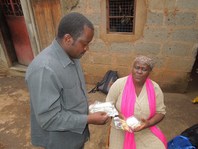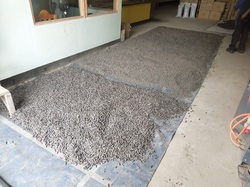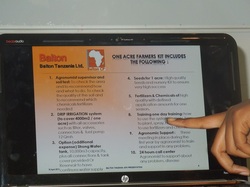
 Biomass pellets in Arusha
Biomass pellets in Arusha We also visited their production hall and were impressed how maize cubs, rice husks and lots of other agricultural waste were transformed into pellets. TREE estimates that a typical Tanzanian family of some 7-8 people would use 50kg of pellets per month that would cost some TSH17,500 (€9 or $11), thus saving about 50% of the costs that would occur with the use of charcoal or kerosene. KIHO is very much eager to also promote such improved cooking stoves for three reasons: 1) conservation of environment because less trees are not cut down anymore, 2) women do not have to walk for hours in the search for firewood, and 3) women have the time to be engaged in income-generating opportunities like small-scale food-processing. One challenge in the rural communities will be to afford on a monthly basis these pellets, as the collection of firewood is for free (it only takes a lot of time). Therefore, KIHO wants to promote such stoves at the beginning mainly in Same town but also in rural areas when women initiatives get involved in jam-making or other income-generating opportunities where they can use such an oven to make money with a very minimized environmental hazard.
 Powerpoint presentation at Balton
Powerpoint presentation at Balton Overall, KIHO was able to profit a lot from these two days in Moshi and Arusha and got some exposure to different opportunities in its work with the local communities in Same District. KIHO hopes that these networking opportunities were the start of some long-lasting partnerships.
 RSS Feed
RSS Feed
